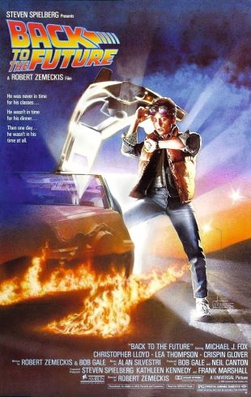This year, 2015, is of particular interest to fans of the Back to the Future trilogy, as it's finally the year that Doc, Marty, and Jennifer visit in Part II. Obviously The Future didn't turn out much like that film showed (although we still have a few more months), although not. perhaps, for lack of trying. One thing that hasn't changed, however, is that the characters and imagery of Back to the Future is still a part of the cultural language.
But why is it, after all that time, that this movie is still so beloved - even by fans, like me, who weren't even born yet when it premiered?
Part of it, I think, is that it's very well done, technically speaking - the story, despite being science fiction of the best kind, is not particularly effects-heavy, and the effects are there succeed (mostly) at seeming realistic, even compared to today's CGI-heavy films.
Aside from the spectacle, Back to the Future also allows for criticism at a deeper level. One example of this is the continuing motif of paradox, not just in the main conflict of the story - Marty imperiling his own existence - but also in the background, such as the name of the town (Hill Valley*) and that of the movie itself. The movie also uses repetition for both humor and dramatic purposes - this is more clear across the whole trilogy, with each new era getting its own Mister Sandman Sequence, but can also be seen in just the first film - as is pointed out at that TvTropes link, Marty's trip across contemporary Hill Valley can be seen as another such sequence, inviting comparisons to all the rest.
But most of all, while clever and well-done, the most important aspect of the movie is that it is fun to watch. Comedy and drama are present in equal amounts, and even when it touches on heavier topics it does so with a light touch. There's an element of wish-fulfillment present, in that almost everyone has at least wondered what it would be like to visit another time, while simultaneously we see some of the problems - even just minor things, like Marty trying to order soft drinks that haven't been invented yet - such travel would cause. But finally, in the end, the seemingly insurmountable problems are overcome, and the adventure continues.
Oh, and the music is great, too.
* Supplementary material claims this is because the town was founded by a man named Hill, but I bet even he could see the humor in it.










No comments:
Post a Comment